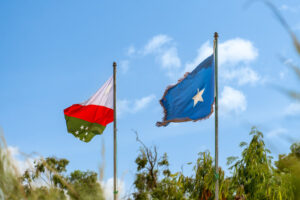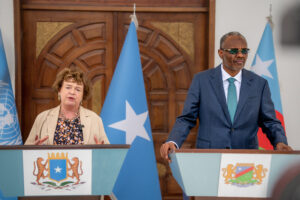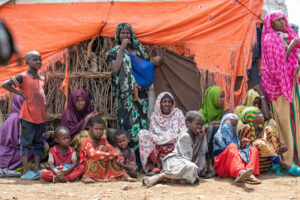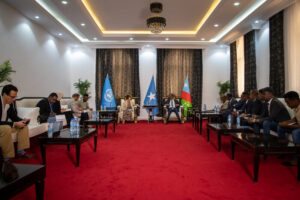South West State was the latest stop for the recently-appointed top United Nations official for Somalia, who today met that Federal Member State’s (FMS) leadership for a wide-ranging exchange on collaboration and support.

“We’ve had a very good conversation, including with key members of his cabinet. We started by talking about the ongoing serious humanitarian situation here in South West State – a part of the country that used to be the breadbasket of Somalia, I hear – but now is one of the most vulnerable due to these repeated droughts,” said the UN Secretary-General’s Special Representative for Somalia, Catriona Laing.
The UN official made the remarks at a joint media encounter with South West States’ President Abdiaziz Hassan Mohamed ‘Laftagareen,’ after an earlier meeting with him and members of his administration.

In her remarks, Ms. Laing added that she and the FMS leader also gave particular focus to one aspect of the humanitarian crisis in South West State, that of internally displaced people (IDPs) – with Somalia’s ongoing drought affecting livelihoods, many IDPs are now seeking aid and new opportunities in urban centres like Baidoa.
According to the latest drought report from the UN Office for the Coordination of Humanitarian Affairs (OCHA), covering up until May 2023, some parts of Somalia have received light to moderate rains, but the amounts are insufficient to alleviate the current drought conditions. However, with no significant rains foreseen and the gu’ season having failed, the drought emergency is likely to deteriorate further.
The UN humanitarian agency’s report added that, as of May, 6.1 million people had been affected by the drought emergency. In South West State, more than one million people are IDPs.

In the UN Special Representative’s exchange with the president, they also discussed how to improve the resilience of South West State in relation to Somalia’s ongoing climate shocks. The Horn of Africa country is at the forefront of climate change, and is seeing more and more climate shocks which have an impact on Somali attempts at state- and peacebuilding.
“We talked about… the importance of preparing for a long-term solution for those IDPs who now live in urban areas,” Ms. Laing noted. “We also talked about the importance of dealing with the underlying drivers of climate change and building resilience and a stronger economic base in the future.”
Away from the humanitarian sphere of work, other topics covered in the meeting included the Federal Member State’s security situation, especially its efforts against the Al-Shabaab terrorist group.

“I commended the president on the really good work to reclaim areas from Al-Shabaab and the importance of us coming behind the government’s very good efforts to stabilise those areas that have been taken back from Al-Shabaab, rebuilding trust with communities as basic services are provided, health workers, education and so on,” MS. Laing said. “And of course, enduring security through police and the local military forces.”
The UN Special Representative’s visit to South West State follows on from earlier visits to the Federal Member States of Hirshabelle and Puntland.Ms. Laing was appointed to her position in May this year and arrived in Somalia last week. Soon after landing in Mogadishu, she met with Somalia’s President Hassan Sheikh Mohamud and Prime Minister Hamza Abdi Barre. In addition to serving in various roles in the government of the United Kingdom, Ms. Laing also served with the UN’s development arm from 1993 to 1994.

